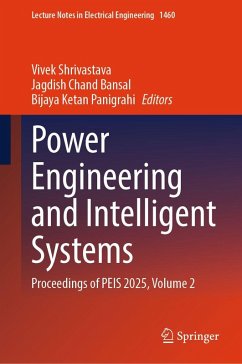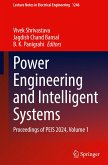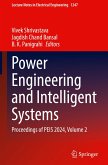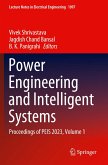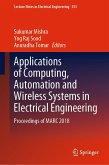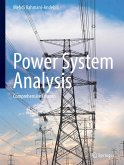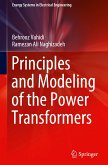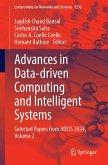Power Engineering and Intelligent Systems
Proceedings of Peis 2025, Volume 2
Herausgegeben:Shrivastava, Vivek; Bansal, Jagdish Chand; Panigrahi, Bijaya Ketan
Power Engineering and Intelligent Systems
Proceedings of Peis 2025, Volume 2
Herausgegeben:Shrivastava, Vivek; Bansal, Jagdish Chand; Panigrahi, Bijaya Ketan
- Gebundenes Buch
- Merkliste
- Auf die Merkliste
- Bewerten Bewerten
- Teilen
- Produkt teilen
- Produkterinnerung
- Produkterinnerung
This book presents a collection of the high-quality research articles in the field of power engineering, grid integration, energy management, soft computing, artificial intelligence, signal and image processing, data science techniques, and their real-world applications. This book is presented at International Conference on Power Engineering and Intelligent Systems (PEIS 2025), held during March 8 9, 2025, at National Institute of Technology Srinagar, Uttarakhand, India. This book is presented in two volumes.
Andere Kunden interessierten sich auch für
![Power Engineering and Intelligent Systems Power Engineering and Intelligent Systems]() Power Engineering and Intelligent Systems211,99 €
Power Engineering and Intelligent Systems211,99 €![Power Engineering and Intelligent Systems Power Engineering and Intelligent Systems]() Power Engineering and Intelligent Systems213,99 €
Power Engineering and Intelligent Systems213,99 €![Power Engineering and Intelligent Systems Power Engineering and Intelligent Systems]() Power Engineering and Intelligent Systems226,99 €
Power Engineering and Intelligent Systems226,99 €![Applications of Computing, Automation and Wireless Systems in Electrical Engineering Applications of Computing, Automation and Wireless Systems in Electrical Engineering]() Applications of Computing, Automation and Wireless Systems in Electrical Engineering234,99 €
Applications of Computing, Automation and Wireless Systems in Electrical Engineering234,99 €![Power System Analysis Power System Analysis]() Mehdi Rahmani-AndebiliPower System Analysis76,99 €
Mehdi Rahmani-AndebiliPower System Analysis76,99 €![Principles and Modeling of the Power Transformers Principles and Modeling of the Power Transformers]() Behrooz VahidiPrinciples and Modeling of the Power Transformers91,99 €
Behrooz VahidiPrinciples and Modeling of the Power Transformers91,99 €![Advances in Data-Driven Computing and Intelligent Systems Advances in Data-Driven Computing and Intelligent Systems]() Advances in Data-Driven Computing and Intelligent Systems191,99 €
Advances in Data-Driven Computing and Intelligent Systems191,99 €-
-
-
This book presents a collection of the high-quality research articles in the field of power engineering, grid integration, energy management, soft computing, artificial intelligence, signal and image processing, data science techniques, and their real-world applications. This book is presented at International Conference on Power Engineering and Intelligent Systems (PEIS 2025), held during March 8 9, 2025, at National Institute of Technology Srinagar, Uttarakhand, India. This book is presented in two volumes.
Produktdetails
- Produktdetails
- Lecture Notes in Electrical Engineering 1460
- Verlag: Springer / Springer Nature Singapore / Springer, Berlin
- Artikelnr. des Verlages: 978-981-96-9719-9
- Seitenzahl: 616
- Erscheinungstermin: 5. Januar 2026
- Englisch
- Abmessung: 235mm x 155mm
- ISBN-13: 9789819697199
- ISBN-10: 9819697190
- Artikelnr.: 74389548
- Herstellerkennzeichnung
- Libri GmbH
- Europaallee 1
- 36244 Bad Hersfeld
- gpsr@libri.de
- Lecture Notes in Electrical Engineering 1460
- Verlag: Springer / Springer Nature Singapore / Springer, Berlin
- Artikelnr. des Verlages: 978-981-96-9719-9
- Seitenzahl: 616
- Erscheinungstermin: 5. Januar 2026
- Englisch
- Abmessung: 235mm x 155mm
- ISBN-13: 9789819697199
- ISBN-10: 9819697190
- Artikelnr.: 74389548
- Herstellerkennzeichnung
- Libri GmbH
- Europaallee 1
- 36244 Bad Hersfeld
- gpsr@libri.de
Dr. Vivek Shrivastava is currently Professor at the National Institute of Technology, Uttarakhand, India. He has more than 20 years of diversified experience in teaching-learning, accreditation, research, industrial, and academic leadership in India, China, and the USA. Before his academic assignments, he worked as a System Reliability Engineer at SanDisk Semiconductors in Shanghai China and USA. Dr. Shrivastava has significant industrial experience in collaborating with industry and Government organizations. He had significant contributions at SanDisk Semiconductors to design and development of memory products. He has extensive experience in academic administration in various capacities of Dean (Research & Consultancy), Dean ( Faculty Welfare), Dean (Student Welfare), Registrar (I/c), and Expert in various committees of AICTE, UGC, etc. Dr. Shrivastava has published over 100 journal articles, papers in conferences, and book chapters. He has supervised 07 Ph.D. and 20 Masters Students. Dr. Jagdish Chand Bansal is Associate Professor at South Asian University, New Delhi and Visiting Faculty at Maths and Computer Science, Liverpool Hope University, UK. Dr. Bansal has obtained his Ph.D. in Mathematics from IIT Roorkee. Before joining SAU New Delhi he has worked as an Assistant Professor at ABV—Indian Institute of Information Technology and Management Gwalior and BITS Pilani. His Primary area of interest is Swarm Intelligence and Nature Inspired Optimization Techniques. Recently, he proposed a fission-fusion social structure-based optimization algorithm, Spider Monkey Optimization (SMO), which is being applied to various problems from engineering domain. He has published more than 70 research papers in various international journals/conferences. He is Editor in Chief of the journal MethodsX published by Elsevier. He is the series editor of the book series Algorithms for Intelligent Systems (AIS) and Studies in Autonomic, Data-driven and Industrial Computing (SADIC) published by Springer. Bijaya Ketan Panigrahi is Professor in the Electrical Engineering Department, IIT Delhi, India. Prior to joining IIT Delhi in 2005, he has served as a Faculty in Electrical Engineering Department, UCE Burla, Odisha, India, from 1992 to 2005. He is Fellow of INAE, India. His research interest includes application of soft computing and evolutionary computing techniques to power system planning, operation, and control. He has been also working in the field of bio-medical signal processing and image processing. He has served as Editorial Board Member, Associate Editor, and special issue Guest Editor of different international journals. He is also associated with various international conferences in various capacities. He has published more than 100 research papers in various international and national journals.
1. A Rule-Based Fuzzy Model for the Classification of Stakeholders of an Information System.- 2. Deep Fake Detection using Xception and Temporal Convolutional Networks.- 3. A Goal-Oriented Methodology for Eliciting the Requirements of an Information System.- 4. Advancements and Analysis of Machine Learning Techniques for Lung Cancer Detection.- 5. Prediction of Parkinson s Disease using Ensemble Learning.- 6. Dental Cavity Detection using Instance Segmentation and Object Detection.- 7. Early Caries Detection using CNN Based Models.- 8. Interactive Gaming Therapy for Children with Cerebral Palsy.
1. A Rule-Based Fuzzy Model for the Classification of Stakeholders of an Information System.- 2. Deep Fake Detection using Xception and Temporal Convolutional Networks.- 3. A Goal-Oriented Methodology for Eliciting the Requirements of an Information System.- 4. Advancements and Analysis of Machine Learning Techniques for Lung Cancer Detection.- 5. Prediction of Parkinson s Disease using Ensemble Learning.- 6. Dental Cavity Detection using Instance Segmentation and Object Detection.- 7. Early Caries Detection using CNN Based Models.- 8. Interactive Gaming Therapy for Children with Cerebral Palsy.

